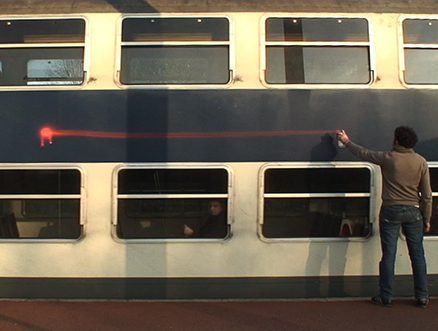05 Jun 2015

Fayçal Baghriche, Point, line, particles (still), 2008. Video. Courtesy of the artist.
Ibraaz announces the research remit for Platform 009, which will address the following question: What are the genealogies of performance art in North Africa and the Middle East?
In asking this question, Ibraaz’s Platform 009 will examine the occluded and overt histories of performance art in the Arab world. Given the increasingly precarious nature of cultural practices and heritage across the region, the history of performance art in the Arab world would appear to speak to a specific historical condition of both critical neglect and hermeneutic prescriptiveness. Exploring dance, performance, collaborations, film documentation and video, socio-political activism and the emerging languages of the digital, Platform 009 will address these elisions and oversights. Driven by artists and cultural practitioners who are working across diverse media, we will map the historical range of practices and theories associated with the labels « performance, » « performance art » and « performativity » in the Arab world today.
For the launch of the platform, we present essays, projects, responses and interviews, including a wide-ranging conversation between Hassan Sharif and Nujoom Al Ghanem that considers Sharif’s background in performance art in the UAE in the 1980s and how we might frame our research in the long term. We are also pleased to present an edited video compilation of Sharif’s performance works from 1995 to 2013 on the Ibraaz Channel, alongside an exclusive video portrait of Jumana Emil Abboud taking part in her Performance as Process residency at the Delfina Foundation in 2015.
The history of performance art in the region is being written today. It is time for the artists of the region, as Hassan Sharif notes in the interview presented here, to come forward and write their own histories of performance as a formative rather than marginal practice. To this end, we have invited a number of artists to engage other artists in conversations including Monira Al Qadiri, who talks to Lidia Al Kattan about the fantastical mirror mosaics that cover her entire home in Kuwait, and Sarah Abu Abdallah who, along with Abdullah Mutairi, engages in a conversation about the complex nature of contemporary performance works. Elsewhere, Malak Helmy and Sophia Al-Maria explore the politics of sexualization in a conversation about the Vagina Monologues. In a series of extended essays, Tania El Khoury (of the Dictaphone Group), considers the question of performance from both a collective and personal perspective; while Samah Hijawi traces a history of performance art as political gesture in Jordan. A key theme throughout this platform, one that emerges throughout our conversation with Rabih Mroué, is the immediacy of performance as a temporal and ultimately transient act that produces a degree of historical intimacy that is difficult to imagine in other media.
Future contributors to Platform 009 will include, amongst others, Sarah Abu Abdallah, Suleiman Al-Bassam, Lawrence Abu Hamdan, Sophia Al-Maria, Burak Alzaid, Nahrain Al-Mousawi, Doa Aly, Marwa Arsanios, Seth Ayyaz, Rayya Badran, Shiva Balaghi, Aaron Cesar, Iftikhar Dadi, Hassan Darsi, Sussan Deyhim, Tania El Khoury, Ismail Fayed, Wafa Gabsi, Rana Hamadeh, Samah Hijawi, Shuruq Harb, Malak Helmy, Hasan Hujairi, Hiwa K., Sohrab Kashani, Hassan Khan, Alexandra Helen Macgilp, Morad Montazami, Abdullah Mutairi, Joe Namy, Sondos Shabayek, and Ala Younis.
Given the historical importance of the subject matter in hand, Ibraaz’s research platform will move, for the first time, from a six- to a twelve-month cycle and an extended reader, edited by Anthony Downey, will be published in 2016 to coincide with a series of conferences on the subject. We are also pleased to confirm that Ibraaz will publish an online guide for the Delfina Foundation’s Staging Histories project (to be showcased at the Hayward Gallery in June and expanded at Delfina in July). Ibraaz will also publish an extended online catalogue for that show in September 2015.